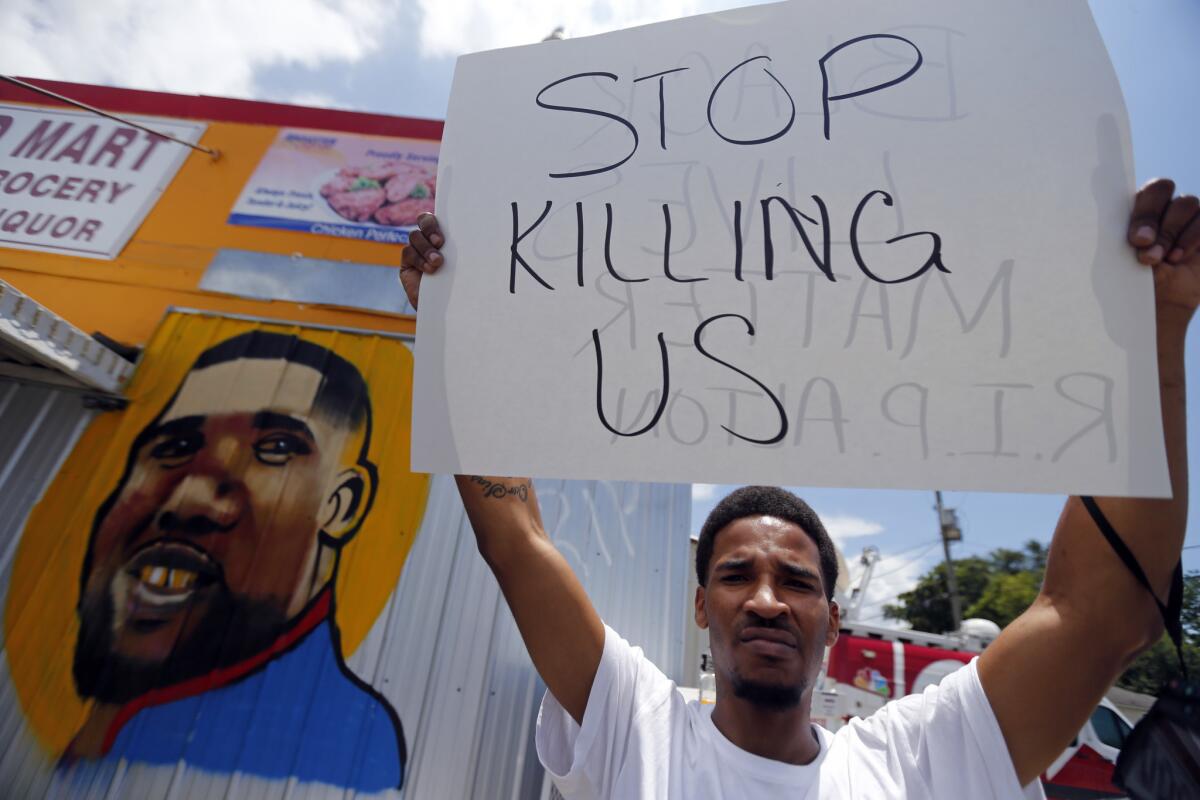Column: The shootings of Alton Sterling and Philando Castile – through the eyes of children

I want Daddy.
Those three words from Alton Sterling’s son said everything.
Watching someone die through the lens of a cellphone camera gives most of us a visceral combination of emotions. But seeing the fatal police shootings this week of Sterling and Philando Castile through the eyes of their children stirs an even more raw sense of tragedy and helplessness.
I want Daddy.
Cameron Sterling put his arm around his mom, whose voice quivered as she began to speak at a news conference about Sterling’s death outside a convenience store in Baton Rouge, La. The 15-year-old boy stood tall next to her, a support beside her. But as she continued, he covered his face with the collar of his shirt, crumpling into inconsolable tears. It was a primal cry from a distraught child who had watched a video of his father dying.
I want Daddy.
His words and tears were haunting, his aching palpable as his mother stoically related a story that seemed far too familiar.
To him, though, this wasn’t simply another story about a black man killed by police. This was his daddy – and it is now his story.
I can’t watch this video without breaking into tears myself, thinking of my own children. Every day, I hear my daughter say those same words – I want Daddy – as she reaches for a goodnight snuggle with her father, tries to negotiate her way out of trouble or searches for a healing kiss when she scrapes her knee. It is wrapping herself in his enveloping arms that gives her comfort – a sense that everything will be all right, that he will protect her, that she is safe.
But Sterling’s teenage son couldn’t find that comfort or safety in his father’s arms as he wailed for his daddy.
He never will again.
Philando Castile lay dying in the front seat of their car as his girlfriend sat beside him, her daughter in the back seat.
Diamond “Lavish” Reynolds had maintained composure during most of the 10-minute live stream she broadcast of the aftermath of Castile’s fatal encounter with a police officer in Falcon Heights, Minn. She narrated what had happened and responded to the officer, who was still pointing his gun into the window. Considering an officer had just shot her boyfriend with her daughter nearby, she was remarkably calm.
Her daughter was understandably scared. She saw, heard and smelled a gun as it fired into her car at someone she knew and loved.
I’m scared, Mommy.
Her mother comforted her. “Don’t be scared.”
Then that unflappable composure cracked. Reynolds began to cry, her voice cracking as she spoke to the camera, more to herself than anyone, reliving what had just happened. Then there was another voice: Her daughter’s.
That’s OK, Mommy….It’s OK, I’m right here with you.
Her 4-year-old comforted her.
“My daughter’s been being stronger than me,” Reynolds said after the two were released from police custody the next morning. “She is the warrior behind this. Without this little angel on my side, I would never have been able to make it through this.”
We usually are the ones comforting our children. We remain strong for them. We protect them. But she was there for her mom.
And like Sterling’s children and the children before them who have lost parents to violence, it is now her story. When she grows up, that will be her childhood memory: When she was 4 years old, she watched her mother’s boyfriend die. She saw a police officer shoot him. She sat in the back of a police car. She spent a night in the jail.
She was right there, with her mommy.
Twitter: @mmaltaisLA
ALSO
Beyonce's response to the deaths of Alton Sterling and Philando Castile
Months before Alton Sterling was shot, Baton Rouge parade floats seemed to mock Black Lives Matter
As police shootings continue, bystanders get more sophisticated at filming altercations
Sign up for Essential California
The most important California stories and recommendations in your inbox every morning.
You may occasionally receive promotional content from the Los Angeles Times.








